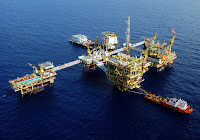 To begin with, Brent’s strength relative to its American counterpart index continues, as the ICE Brent forward month futures contract climbed to US$101.01, last time I checked today. There are pressures to the upside bolstering the price rise, but impact of the Egyptian political crisis on traffic through the Suez Canal is not as clear cut as many popular media commentators make it out to be.
To begin with, Brent’s strength relative to its American counterpart index continues, as the ICE Brent forward month futures contract climbed to US$101.01, last time I checked today. There are pressures to the upside bolstering the price rise, but impact of the Egyptian political crisis on traffic through the Suez Canal is not as clear cut as many popular media commentators make it out to be.According to wires and international broadcasters, the Suez Canal is still functioning as normal and continues to be heavily guarded by the Egyptian forces. So while the potential of traffic disruption is there, I am not so sure how it can manifest itself so soon in a meaningful way. There are other factors behind, as I noted yesterday, in Brent’s strength.
Elsewhere, if you haven’t heard BP has reported an annual loss of US$4.9 billion for 2010, it’s first, though unsurprising annual loss since 1992. This compares rather unfavourably with a profit of US$13.9 billion the oil major recorded in 2009. The Gulf of Mexico oil spill has blown a Macondo sized whole in its books, though the company said it would restore its dividend payment to shareholders hitherto suspended in wake of the Gulf spill.
Another key announcement was BP’s decision to sell two US oil refineries in Texas and California thereby halving its refining capacity in the US. The sale includes the Texas City refinery, where 15 workers were killed in an explosion in 2005 – the site of BP’s last disaster in the States prior to Macondo.
The announcement vindicates my analysis for Infrastructure Journal back in November. BP is not alone; the oil majors no longer regard refining as central to their business. There’s a part of me that thinks BP would have sold its refinery assets, even if the Gulf of Mexico tragedy had not happened. The incident only brought the sale forward.
© Gaurav Sharma 2011. Photo: Macondo containment, Gulf of Mexico, USA © BP Plc
